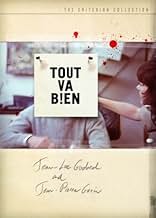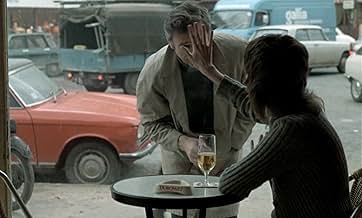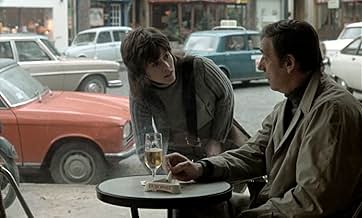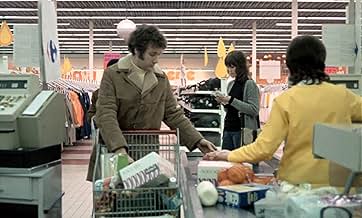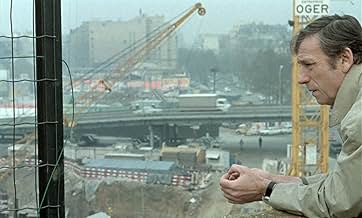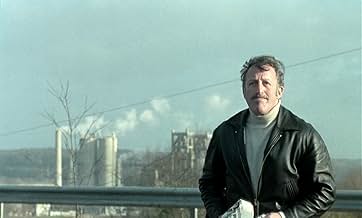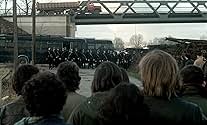VALUTAZIONE IMDb
6,5/10
4056
LA TUA VALUTAZIONE
Una coppia di intellettuali in crisi, lui regista impegnato, lei giornalista americana, è coinvolta nell'occupazione di una fabbrica di salumi dove si scontrano sindacalisti tradizionali ed ... Leggi tuttoUna coppia di intellettuali in crisi, lui regista impegnato, lei giornalista americana, è coinvolta nell'occupazione di una fabbrica di salumi dove si scontrano sindacalisti tradizionali ed estremisti.Una coppia di intellettuali in crisi, lui regista impegnato, lei giornalista americana, è coinvolta nell'occupazione di una fabbrica di salumi dove si scontrano sindacalisti tradizionali ed estremisti.
- Regia
- Sceneggiatura
- Star
- Premi
- 1 vittoria in totale
Louis Bugette
- Georges
- (as Bugette)
Yves Gabrielli
- Léon
- (as Yves Gabrieli)
Recensioni in evidenza
In the wake of May 1968 which effectually bookends the unrivaled movement of Nouvelle Vague, Godard founded Groupe Dziga Vertov (1968-1972), among which Maoist Jean-Pierre Gorin is a key figure, and TOUT VA BIEN is the most well-known works of the group's output, also heralds Godard's seminal transition from narrative tradition to a more essayistic, esoteric platform to which he has cleft ever since.
International star power swells in TOUT VA BIEN, Jane Fonda, freshly copping her first Oscar for KLUTE (1971), but subsequently...
keep reading my review on my blog: cinema omnivore, thanks!
International star power swells in TOUT VA BIEN, Jane Fonda, freshly copping her first Oscar for KLUTE (1971), but subsequently...
keep reading my review on my blog: cinema omnivore, thanks!
Godard builds his films from scratch. It's not that he shows up on the first day of shooting with no script or idea of what he wants. He simply works from an entirely different angle than most other directors. In an inventive, cerebral, pretentious manor, Godard and his co- director here, Jean-Pierre Gorin, shows us scene after scene. After each one, we naturally ask ourselves questions pertaining to the characters and the story. The story, or should I say the film, unravels further. We then not only ask ourselves the expected question, "What does this movie mean?" We also ask ourselves, "What is this movie about?" Godard drops characters and settings into a stirring pot, sprinkling it with title cards and captions, then pours them all into the oddly shape bowl of a film structure that he has fashioned himself. His cinematic expression is less a communication to and more a confrontation with the audience. He does not make his film easy on you. Still, his cinematography is interesting, and I admire some of his ideas.
Have I made it unclear where Tout Va Bien stands in my opinion? OK. Well, let me tell you that it is quite an interesting film, an especially unpredictable one, yet Godard and Gorin, as the occasional European filmmaker will do, just as Haneke does, enjoy the feeling of being beyond the audience. What is said with Tout Van Bien, politically, socially, sexually, is expressed as if we, the audience, are the ignorant ones he is in disagreement with.
The high points of this film are the presence of Jane Fonda and a very very long sideways steadicam shot that slowly moves from left to right repeatedly across several check-out lines in a grocery store as tension and rage slowly builds.
Have I made it unclear where Tout Va Bien stands in my opinion? OK. Well, let me tell you that it is quite an interesting film, an especially unpredictable one, yet Godard and Gorin, as the occasional European filmmaker will do, just as Haneke does, enjoy the feeling of being beyond the audience. What is said with Tout Van Bien, politically, socially, sexually, is expressed as if we, the audience, are the ignorant ones he is in disagreement with.
The high points of this film are the presence of Jane Fonda and a very very long sideways steadicam shot that slowly moves from left to right repeatedly across several check-out lines in a grocery store as tension and rage slowly builds.
Although I'm quite familiar with most of Jean-Luc Godard's career, there is that 1970s period where he completely abandoned commercialism in all its forms and made experimental political films with Jean-Pierre Gorin and others. Tout Va Bien is not an impossible work, but it is challenging and, even if you win that challenge, the rewards are fairly limited. But it's interesting work, and Godard's fractured cinematic imagination is definitely brilliant at times. The grocery store sequence near the end of the film is as cinematic ally accomplished and impressive as the tracking shot of the apocalyptic highway in Week-End. And I love the meta-cinematic material at the beginning, where the filmmakers discuss how they can make a political film about May '68 and how the movement has evolved in the following four years. Step on: hire some stars. With stars come money. Thus Yves Montand and Jane Fonda are recruited for that purpose. The longest segment of the film has the two stars trapped with the manager of a slaughterhouse as his workers bar him from leaving his office. Godard and Gorin have a set designed after that large-windowed apartment building in Tati's Playtime. Perhaps it is even the same exact set, remodeled a bit for the way they want to use it here? The new Criterion DVD includes a follow-up film, A Letter to Jane, which discusses the famous photograph of Fonda meeting with the Viet-Cong. It is nearly unwatchable, though, and I gave up after 15 or 20 minutes (it's 52 minutes of Godard and Gorin speechifying which is also prevalent (and hard to take) in Tout Va Bien, as well).
Jean-Luc Godard's follow-up to the ultra-Maoist Weekend, featuring Yves Montand as a former New Wave filmmaker and his wife Jane Fonda, as they become active in a factory takeover. The film is of course very sympathetic to Marxism and perhaps Leninism, but it's certainly toned down from the blood fest that is Weekend, perhaps regrettably. Godard insists on reinterpreting and imposing entirely new ideas about what a film can and ought to be, in this case an intellectualized espousal of the working class struggle. A few moments of daring misce-en-scene are worth mentioning; fist, Godard includes an awesome cutaway of the factory to reveal the power-dynamics of the uprising within, and an elaborate tracking sequence in a supermarket to reveal the gross stupidity of capitalist consumerism. Tout Va Bien is clearly a step-down from Godard's brilliant features of the 60's, but it's still provocative and worth any cinephile's time.
I find that the films of Jean-Luc Godard rarely speak to me, but they do, such as Pierrot Le Fou, it really hits hard. Perhaps he's most effective when he talks about cinema itself. While Pierrot is most profoundly interesting through its debate about the arts, Tout Va Bien immediately addresses its own existence in its opening scene. It analyzes premise, storytelling, filmmaking and how they got the film made with how it cast two major stars in the lead roles. It's fascinatingly direct, almost confessional. With this abrasive and confrontational style in mind it charges full throttle into its politics of the French revolution in the late 60s as the lower and middle classes rebel against capitalism. While sometimes it can be a little too on-the-nose with its arguments as characters talk to the audience, Godard's point is undeniable and its very well demonstrated through the style. The highlight of the film is definitely the use of sets and colour. I love the stage-like sets where you can see into two floors and a dozen rooms. It categorizes the drama in a cartoonish way that satirizes the politics brilliantly while still retaining their power. Although this argument does interrupt the initial contrived story, it jumps back into it seamlessly making it work for the characters in an unexpectedly emotional way. Tout Va Bien is an incredible film and one of Godard's finest efforts. It lived up to my expectations and more.
9/10
9/10
Lo sapevi?
- QuizMost of the shots contain all the three colours of the French flag: blue, white and red.
- Citazioni
Narrator: There'd be farmers who farm. Workers who work. And bourgeois who bourgeois.
- ConnessioniEdited into Bande-annonce de 'Tout va bien' (1972)
- Colonne sonoreIl y a du Soleil sur la France
Music by Eric Charden
Lyrics by Frank Thomas and Jean-Michel Rivat
Performed by Stone et Charden
I più visti
Accedi per valutare e creare un elenco di titoli salvati per ottenere consigli personalizzati
- How long is All's Well?Powered by Alexa
Dettagli
- Tempo di esecuzione
- 1h 35min(95 min)
- Mix di suoni
- Proporzioni
- 1.66 : 1
Contribuisci a questa pagina
Suggerisci una modifica o aggiungi i contenuti mancanti

